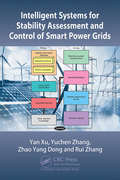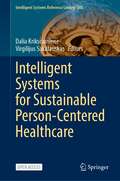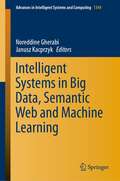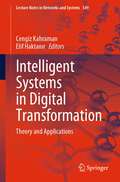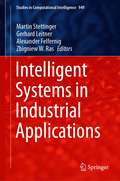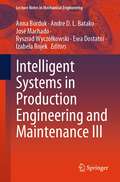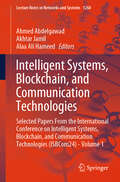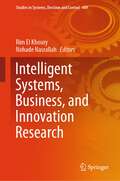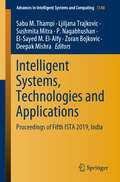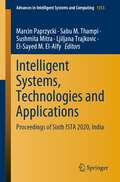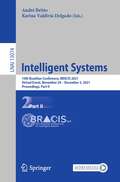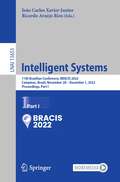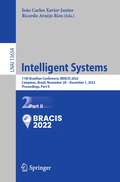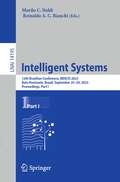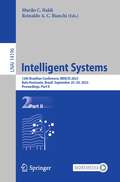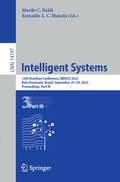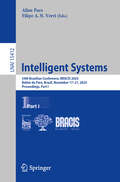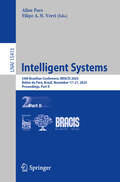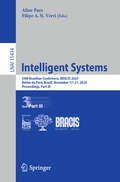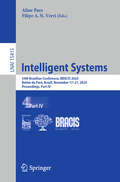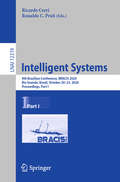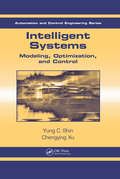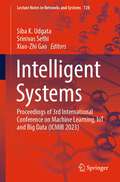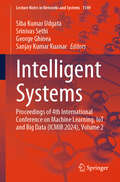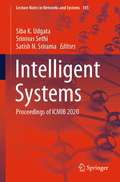- Table View
- List View
Intelligent Systems for Stability Assessment and Control of Smart Power Grids: Security Analysis, Optimization, and Knowledge Discovery
by Yan Xu Rui Zhang Zhao Yang Dong Yuchen ZhangPower systems are evolving towards the Smart Grid paradigm, featured by large-scale integration of renewable energy resources, e.g. wind and solar power, deeper participation of demand side, and enhanced interaction with electric vehicles. While these emerging elements are inherently stochastic in nature, they are creating a challenge to the system’s stability and its control. In this context, conventional analysis tools are becoming less effective, and necessitate the use alternative tools that are able to deal with the high uncertainty and variability in the smart grid. Smart Grid initiatives have facilitated wide-spread deployment of advanced sensing and communication infrastructure, e.g. phasor measurement units at grid level and smart meters at household level, which collect tremendous amount of data in various time and space scales. How to fully utilize the data and extract useful knowledge from them, is of great importance and value to support the advanced stability assessment and control of the smart grid. The intelligent system strategy has been identified as an effective approach to meet the above needs. This book presents the cutting-edge intelligent system techniques and their applications for stability assessment and control of power systems. The major topics covered in this book are: Intelligent system design and algorithms for on-line stability assessment, which aims to use steady-state operating variables to achieve fast stability assessment for credible contingencies. Intelligent system design and algorithms for preventive stability control, which aims at transparent and interpretable decision-making on preventive control actions to manipulate system operating condition against possible contingencies. Intelligent system design and algorithms for real-time stability prediction, which aims to use synchronized measurements to foresee the stability status under an ongoing disturbance. Intelligent system design and algorithms for emergency stability control, which aims at fast decision-making on stability control actions at emergency stage where instability is propagating. Methodologies and algorithms for improving the robustness of intelligent systems against missing-data issues. This book is a reference and guide for researchers, students, and engineers who seek to study and design intelligent systems to resolve stability assessment and control problems in the smart grid age.
Intelligent Systems for Sustainable Person-Centered Healthcare (Intelligent Systems Reference Library #205)
by Dalia Kriksciuniene Virgilijus SakalauskasThis open access book establishes a dialog among the medical and intelligent system domains for igniting transition toward a sustainable and cost-effective healthcare. The Person-Centered Care (PCC) positions a person in the center of a healthcare system, instead of defining a patient as a set of diagnoses and treatment episodes. The PCC-based conceptual background triggers enhanced application of Artificial Intelligence, as it dissolves the limits of processing traditional medical data records, clinical tests and surveys. Enhanced knowledge for diagnosing, treatment and rehabilitation is captured and utilized by inclusion of data sources characterizing personal lifestyle, and health literacy, and it involves insights derived from smart ambience and wearables data, community networks, and the caregivers’ feedback. The book discusses intelligent systems and their applications for healthcare data analysis, decision making and process design tasks. The measurement systems and efficiency evaluation models analyze ability of intelligent healthcare system to monitor person health and improving quality of life.
Intelligent Systems in Big Data, Semantic Web and Machine Learning (Advances in Intelligent Systems and Computing #1344)
by Janusz Kacprzyk Noreddine GherabiThis book describes important methodologies, tools and techniques from the fields of artificial intelligence, basically those which are based on relevant conceptual and formal development. The coverage is wide, ranging from machine learning to the use of data on the Semantic Web, with many new topics. The contributions are concerned with machine learning, big data, data processing in medicine, similarity processing in ontologies, semantic image analysis, as well as many applications including the use of machine leaning techniques for cloud security, artificial intelligence techniques for detecting COVID-19, the Internet of things, etc. The book is meant to be a very important and useful source of information for researchers and doctoral students in data analysis, Semantic Web, big data, machine learning, computer engineering and related disciplines, as well as for postgraduate students who want to integrate the doctoral cycle.
Intelligent Systems in Digital Transformation: Theory and Applications (Lecture Notes in Networks and Systems #549)
by Cengiz Kahraman Elif HaktanırThis book states that intelligent digital transformation is the process of using artificial intelligence techniques in digital technologies such as machine learning, natural language processing, automation and robotics to transform existing non-digital business processes and services to meet with the evolving market and customer expectations. This book including 26 chapters, each written by their experts, focuses on revealing the reflection of digital transformation in our business and social life under emerging conditions through intelligent systems. Intelligent digital transformation examples from almost all sectors including health, education, manufacturing, tourism, insurance, smart cities, banking, energy and transportation are introduced by theory and applications. The intended readers are managers responsible for digital transformation, intelligent systems researchers, lecturers, and MSc and PhD students studying digital transformation.
Intelligent Systems in Industrial Applications (Studies in Computational Intelligence #949)
by Alexander Felfernig Gerhard Leitner Zbigniew W. Ras Martin StettingerThis book presents a selection of papers from the industrial track of ISMIS 2020. The selection emphasizes broad applicability of artificial intelligence (AI) technologies in various industrial fields. The aim of the book is to fertilize preliminary ideas of readers on the application of AI by means of already successfully implemented application examples. Furthermore, the development of new ideas and concepts shall be motivated by the variety of different application examples. The spectrum of the presented contributions ranges from education and training, industrial applications in production and logistics to the development of new approaches in basic research, which will further expand the possibilities of future applications of AI in industrial settings. This broad spectrum gives readers working in the industrial as well as the academic field a good overview of the state of the art in the field of methodologies for intelligent systems.
Intelligent Systems in Production Engineering and Maintenance III (Lecture Notes in Mechanical Engineering)
by Anna Burduk José Machado Andre D. L. Batako Ryszrad Wyczółkowski Ewa Dostatni Izabela RojekThis book reports on intelligent methods and solutions in engineering production and maintenance. It describes advanced tools for optimizing production processes, increasing their automation, safety and sustainability. Contributions cover different stages of the production process, such as product design, supply chain, and equipment maintenance and safety. This is one of the two volumes based on the 4th International Conference on Intelligent Systems in Production Engineering and Maintenance, ISPEM 2023, held on September 13-15, 2023, in Wroclaw, Poland.
Intelligent Systems, Blockchain, and Communication Technologies: Selected Papers From the International Conference on Intelligent Systems, Blockchain, and Communication Technologies (ISBCom24) - Volume 1 (Lecture Notes in Networks and Systems #1268)
by Ahmed Abdelgawad Akhtar Jamil Alaa Ali HameedThis proceedings book comprises high-quality papers from the 1st International Conference on Intelligent Systems, Blockchain, and Communication Technologies (ISBCom-2024), offering insights into the integration of computing, IoT, and data analytics across diverse fields. Structured to emphasize real-world applications, it presents impactful studies that propose novel solutions to current challenges in these domains. The book is a valuable resource for researchers, professionals, and students interested in the latest advancements in intelligent systems and smart technologies. It spans foundational theories to practical implementations, exploring new tools and methodologies for data-driven solutions in areas like artificial intelligence, IoT infrastructures, and data analytics. This collection is essential for those seeking to stay updated on current trends and apply theoretical knowledge to practical, innovative applications.
Intelligent Systems, Business, and Innovation Research (Studies in Systems, Decision and Control #489)
by Rim El Khoury Nohade NasrallahIntelligent systems research is a multidisciplinary field that focuses on the development of systems that can perceive, reason, and act autonomously. This can include areas such as machine learning, artificial intelligence, natural language processing, and robotics. The goal of intelligent systems research is to develop systems that can understand, learn from, and adapt to their environment, to perform tasks that would typically require human intelligence.Business and innovation research is an interdisciplinary field that examines how organizations can create, develop, and implement new ideas, products, and services. This can include areas such as organizational behaviour, strategic management, and marketing. The goal of business and innovation research is to understand how organizations can foster an environment that encourages creativity and innovation, and how they can develop and implement new ideas in a way that leads to success.Intelligent Systems, Business and Innovation Research is a research area that brings together these two fields to study the use of intelligent systems and technologies in the business context to drive innovation, improve operational efficiency and effectiveness of the organization. The book aims to understand how intelligent systems can be used in business applications, how to design and implement them, how to manage the associated challenges, and how to leverage them to foster innovation, create new business models, and gain competitive advantage. It offers guidance on how to navigate potential conflicts and challenges that may arise during multidisciplinary research in areas such as Industry 4.0, Internet of Things, modern machine learning, software agent applications, and data science. The book focuses on the various fields in which intelligent systems play a critical role in enabling the development of advanced technologies that can perform tasks that would typically require human intelligence. For example, in smart/control systems, intelligent algorithms can be used to optimize the performance of machines and devices, while in cyber security, they can be used to protect networks and data from cyber-attacks. In bioinformatics, intelligent systems can be used to analyse large amounts of biological data, while in virtual reality and robotics, they can be used to create realistic and responsive simulations and automatons. Additionally, the book also highlights the rapidly advancing theoretical foundations of fuzzy sets, mathematical logic, and non-classical logic. These are important theoretical frameworks for the development of intelligent systems, as they provide the foundation for the representation and manipulation of uncertainty, complexity, and imprecision. These theoretical foundations are essential in the development of intelligent systems that can make decisions and perform tasks in uncertain, complex, and dynamic environments.
Intelligent Systems, Technologies and Applications: Proceedings of Fifth ISTA 2019, India (Advances in Intelligent Systems and Computing #1148)
by Deepak Mishra Sushmita Mitra Sabu M. Thampi El-Sayed M. El-Alfy P. Nagabhushan Ljiljana Trajkovic Zoran BojkovicThis book explores and discusses various aspects of intelligent systems technologies and their applications. Presenting the refereed post-conference proceedings of the 5th International Symposium on Intelligent Systems Technologies and Applications (ISTA 2019), held at the Indian Institute of Information Technology and Management-Kerala (IIITM-K), Trivandrum, India, on December 18–21, 2019, it covers a variety of topics, such as knowledge discovery, data mining, pattern recognition, signal processing, intelligent image processing, artificial vision, ad hoc and wireless sensor networks, business intelligence and big data analytics.
Intelligent Systems, Technologies and Applications: Proceedings of Sixth ISTA 2020, India (Advances in Intelligent Systems and Computing #1353)
by Sushmita Mitra Sabu M. Thampi El-Sayed M. El-Alfy Marcin Paprzycki Ljiljana TrajkovicThis book offers to readers a selection of refereed papers that were presented at the Sixth International Symposium on Intelligent Systems Technologies and Applications (ISTA’20). All submissions were evaluated on the basis of their significance, novelty, and technical quality. This book consists of 28 papers (19 regular and 9 short papers) that were virtually presented at the Symposium. The papers cover different areas such as big data analytics, security and privacy, Internet of things, machine and deep learning, health informatics, visual computing, signal processing, and natural language processing. The book is directed to the researchers and scientists engaged in various fields of intelligent systems.
Intelligent Systems: 10th Brazilian Conference, BRACIS 2021, Virtual Event, November 29 – December 3, 2021, Proceedings, Part II (Lecture Notes in Computer Science #13074)
by André Britto Karina Valdivia DelgadoThe two-volume set LNAI 13073 and 13074 constitutes the proceedings of the 10th Brazilian Conference on Intelligent Systems, BRACIS 2021, held in São Paolo, Brazil, in November-December 2021. The total of 77 papers presented in these two volumes was carefully reviewed and selected from 192 submissions.The contributions are organized in the following topical sections: Part I: Agent and Multi-Agent Systems, Planning and Reinforcement Learning; Evolutionary Computation, Metaheuristics, Constrains and Search, Combinatorial and Numerical Optimization, Knowledge Representation, Logic and Fuzzy Systems; Machine Learning and Data Mining. Part II: Multidisciplinary Artificial and Computational Intelligence and Applications; Neural Networks, Deep Learning and Computer Vision; Text Mining and Natural Language Processing. Due to the COVID-2019 pandemic, BRACIS 2021 was held as a virtual event.
Intelligent Systems: 11th Brazilian Conference, BRACIS 2022, Campinas, Brazil, November 28 – December 1, 2022, Proceedings, Part I (Lecture Notes in Computer Science #13653)
by João Carlos Xavier-Junior Ricardo Araújo RiosThe two-volume set LNAI 13653 and 13654 constitutes the refereed proceedings of the 11th Brazilian Conference on Intelligent Systems, BRACIS 2022, which took place in Campinas, Brazil, in November/December 2022. The 89 papers presented in the proceedings were carefully reviewed and selected from 225 submissions. The conference deals with theoretical aspects and applications of artificial and computational intelligence.
Intelligent Systems: 11th Brazilian Conference, BRACIS 2022, Campinas, Brazil, November 28 – December 1, 2022, Proceedings, Part II (Lecture Notes in Computer Science #13654)
by João Carlos Xavier-Junior Ricardo Araújo RiosThe two-volume set LNAI 13653 and 13654 constitutes the refereed proceedings of the 11th Brazilian Conference on Intelligent Systems, BRACIS 2022, which took place in Campinas, Brazil, in November/December 2022. The 89 papers presented in the proceedings were carefully reviewed and selected from 225 submissions. The conference deals with theoretical aspects and applications of artificial and computational intelligence.
Intelligent Systems: 12th Brazilian Conference, BRACIS 2023, Belo Horizonte, Brazil, September 25–29, 2023, Proceedings, Part I (Lecture Notes in Computer Science #14195)
by Reinaldo A. C. Bianchi Murilo C. NaldiThe three-volume set LNAI 14195, 14196, and 14197 constitutes the refereed proceedings of the 12th Brazilian Conference on Intelligent Systems, BRACIS 2023, which took place in Belo Horizonte, Brazil, in September 2023. The 90 full papers included in the proceedings were carefully reviewed and selected from 242 submissions. They have been organized in topical sections as follows:Part I: Best papers; resource allocation and planning; rules and feature extraction; AI and education; agent systems; explainability; AI models; Part II: Transformer applications; convolutional neural networks; deep learning applications; reinforcement learning and GAN; classification; machine learning analysis;Part III: Evolutionary algorithms; optimization strategies; computer vision; language and models; graph neural networks; pattern recognition; AI applications.
Intelligent Systems: 12th Brazilian Conference, BRACIS 2023, Belo Horizonte, Brazil, September 25–29, 2023, Proceedings, Part II (Lecture Notes in Computer Science #14196)
by Reinaldo A. C. Bianchi Murilo C. NaldiThe three-volume set LNAI 14195, 14196, and 14197 constitutes the refereed proceedings of the 12th Brazilian Conference on Intelligent Systems, BRACIS 2023, which took place in Belo Horizonte, Brazil, in September 2023. The 90 full papers included in the proceedings were carefully reviewed and selected from 242 submissions. They have been organized in topical sections as follows:Part I: Best papers; resource allocation and planning; rules and feature extraction; AI and education; agent systems; explainability; AI models; Part II: Transformer applications; convolutional neural networks; deep learning applications; reinforcement learning and GAN; classification; machine learning analysis;Part III: Evolutionary algorithms; optimization strategies; computer vision; language and models; graph neural networks; pattern recognition; AI applications.
Intelligent Systems: 12th Brazilian Conference, BRACIS 2023, Belo Horizonte, Brazil, September 25–29, 2023, Proceedings, Part III (Lecture Notes in Computer Science #14197)
by Reinaldo A. C. Bianchi Murilo C. NaldiThe three-volume set LNAI 14195, 14196, and 14197 constitutes the refereed proceedings of the 12th Brazilian Conference on Intelligent Systems, BRACIS 2023, which took place in Belo Horizonte, Brazil, in September 2023. The 90 full papers included in the proceedings were carefully reviewed and selected from 242 submissions. They have been organized in topical sections as follows:Part I: Best papers; resource allocation and planning; rules and feature extraction; AI and education; agent systems; explainability; AI models; Part II: Transformer applications; convolutional neural networks; deep learning applications; reinforcement learning and GAN; classification; machine learning analysis;Part III: Evolutionary algorithms; optimization strategies; computer vision; language and models; graph neural networks; pattern recognition; AI applications.
Intelligent Systems: 34th Brazilian Conference, BRACIS 2024, Belém do Pará, Brazil, November 17–21, 2024, Proceedings, Part I (Lecture Notes in Computer Science #15412)
by Aline Paes Filipe A. N. VerriThe four-volume set LNAI 15412-15415 constitutes the refereed proceedings of the 34th Brazilian Conference on Intelligent Systems, BRACIS 2024, held in Belém do Pará, Brazil, during November 18–21, 2024. The 116 full papers presented here were carefully reviewed and selected from 285 submissions. They were organized in three key tracks: 70 articles in the main track, showcasing cutting-edge AI methods and solid results; 10 articles in the AI for Social Good track, featuring innovative applications of AI for societal benefit using established methodologies; and 36 articles in other AI applications, presenting novel applications using established AI methods, naturally considering the ethical aspects of the application.
Intelligent Systems: 34th Brazilian Conference, BRACIS 2024, Belém do Pará, Brazil, November 17–21, 2024, Proceedings, Part II (Lecture Notes in Computer Science #15413)
by Aline Paes Filipe A. N. VerriThe four-volume set LNAI 15412-15415 constitutes the refereed proceedings of the 34th Brazilian Conference on Intelligent Systems, BRACIS 2024, held in Belém do Pará, Brazil, during November 17–21, 2024. The 116 full papers presented here were carefully reviewed and selected from 285 submissions. They were organized in three key tracks: 70 articles in the main track, showcasing cutting-edge AI methods and solid results; 10 articles in the AI for Social Good track, featuring innovative applications of AI for societal benefit using established methodologies; and 36 articles in other AI applications, presenting novel applications using established AI methods, naturally considering the ethical aspects of the application.
Intelligent Systems: 34th Brazilian Conference, BRACIS 2024, Belém do Pará, Brazil, November 17–21, 2024, Proceedings, Part III (Lecture Notes in Computer Science #15414)
by Aline Paes Filipe A. N. VerriThe four-volume set LNAI 15412-15415 constitutes the refereed proceedings of the 34th Brazilian Conference on Intelligent Systems, BRACIS 2024, held in Belém do Pará, Brazil, during November 17–21, 2024. The 116 full papers presented here were carefully reviewed and selected from 285 submissions. They were organized in three key tracks: 70 articles in the main track, showcasing cutting-edge AI methods and solid results; 10 articles in the AI for Social Good track, featuring innovative applications of AI for societal benefit using established methodologies; and 36 articles in other AI applications, presenting novel applications using established AI methods, naturally considering the ethical aspects of the application.
Intelligent Systems: 34th Brazilian Conference, BRACIS 2024, Belém do Pará, Brazil, November 17–21, 2024, Proceedings, Part IV (Lecture Notes in Computer Science #15415)
by Aline Paes Filipe A. N. VerriThe four-volume set LNAI 15412-15415 constitutes the refereed proceedings of the 34th Brazilian Conference on Intelligent Systems, BRACIS 2024, held in Belém do Pará, Brazil, during November 17–21, 2024. The 116 full papers presented here were carefully reviewed and selected from 285 submissions. They were organized in three key tracks: 70 articles in the main track, showcasing cutting-edge AI methods and solid results; 10 articles in the AI for Social Good track, featuring innovative applications of AI for societal benefit using established methodologies; and 36 articles in other AI applications, presenting novel applications using established AI methods, naturally considering the ethical aspects of the application.
Intelligent Systems: 9th Brazilian Conference, BRACIS 2020, Rio Grande, Brazil, October 20–23, 2020, Proceedings, Part I (Lecture Notes in Computer Science #12319)
by Ronaldo C. Prati Ricardo CerriThe two-volume set LNAI 12319 and 12320 constitutes the proceedings of the 9th Brazilian Conference on Intelligent Systems, BRACIS 2020, held in Rio Grande, Brazil, in October 2020. The total of 90 papers presented in these two volumes was carefully reviewed and selected from 228 submissions. The contributions are organized in the following topical section: Part I: Evolutionary computation, metaheuristics, constrains and search, combinatorial and numerical optimization; neural networks, deep learning and computer vision; and text mining and natural language processing. Part II: Agent and multi-agent systems, planning and reinforcement learning; knowledge representation, logic and fuzzy systems; machine learning and data mining; and multidisciplinary artificial and computational intelligence and applications.Due to the Corona pandemic BRACIS 2020 was held as a virtual event.
Intelligent Systems: Modeling, Optimization, and Control (Automation and Control Engineering #30)
by Yung C. Shin Chengying XuProviding a thorough introduction to the field of soft computing techniques, Intelligent Systems: Modeling, Optimization, and Control covers every major technique in artificial intelligence in a clear and practical style. This book highlights current research and applications, addresses issues encountered in the development of applied systems, and describes a wide range of intelligent systems techniques, including neural networks, fuzzy logic, evolutionary strategy, and genetic algorithms. The book demonstrates concepts through simulation examples and practical experimental results. Case studies are also presented from each field to facilitate understanding.
Intelligent Systems: Proceedings of 3rd International Conference on Machine Learning, IoT and Big Data (ICMIB 2023) (Lecture Notes in Networks and Systems #728)
by Xiao-Zhi Gao Siba K. Udgata Srinivas SethiThis book features best selected research papers presented at the Third International Conference on Machine Learning, Internet of Things and Big Data (ICMIB 2023) held at Indira Gandhi Institute of Technology, Sarang, India, during March 10–12, 2023. It comprises high-quality research work by academicians and industrial experts in the field of machine learning, mobile computing, natural language processing, fuzzy computing, green computing, human–computer interaction, information retrieval, intelligent control, data mining and knowledge discovery, evolutionary computing, IoT and applications in smart environments, smart health, smart city, wireless networks, big data, cloud computing, business intelligence, Internet security, pattern recognition, predictive analytics applications in health care, sensor networks and social sensing, and statistical analysis of search techniques.
Intelligent Systems: Proceedings of 4th International Conference on Machine Learning, IoT and Big Data (ICMIB 2024), Volume 2 (Lecture Notes in Networks and Systems #1149)
by George Ghinea Siba Kumar Udgata Sanjay Kumar Kuanar Srinivas SethiThis book features best selected research papers presented at the Fourth International Conference on Machine Learning, Internet of Things and Big Data (ICMIB 2024) held at GIET University, Gunupur, India, during 8–10 April 2024. It comprises high-quality research work by academicians and industrial experts in the field of machine learning, mobile computing, natural language processing, fuzzy computing, green computing, human–computer interaction, information retrieval, intelligent control, data mining and knowledge discovery, evolutionary computing, IoT and applications in smart environments, smart health, smart city, wireless networks, big data, cloud computing, business intelligence, Internet security, pattern recognition, predictive analytics applications in health care, sensor networks and social sensing, and statistical analysis of search techniques.
Intelligent Systems: Proceedings of ICMIB 2020 (Lecture Notes in Networks and Systems #185)
by Siba K. Udgata Srinivas Sethi Satish N. SriramaThis book features best selected research papers presented at the International Conference on Machine Learning, Internet of Things and Big Data (ICMIB 2020) held at Indira Gandhi Institute of Technology, Sarang, India, during September 2020. It comprises high-quality research work by academicians and industrial experts in the field of machine learning, mobile computing, natural language processing, fuzzy computing, green computing, human–computer interaction, information retrieval, intelligent control, data mining and knowledge discovery, evolutionary computing, IoT and applications in smart environments, smart health, smart city, wireless networks, big data, cloud computing, business intelligence, internet security, pattern recognition, predictive analytics applications in healthcare, sensor networks and social sensing and statistical analysis of search techniques.
